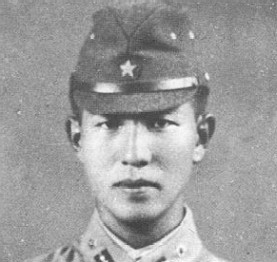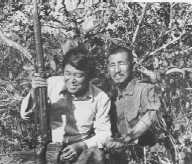Amazing story of jungle survival: Japanese soldier who stayed in the jungle for 30 years after WW2
Hirō Onoda was an Imperial Japanese Army intelligence officer who fought in World War II and was a Japanese holdout who did not surrender in 1945.
After Onoda had spent nearly 30 years holding out in the Philippines, his former commander traveled from Japan to personally issue orders relieving him from duty in 1974. He held the rank of second lieutenant in the Imperial Japanese Army.
Onoda continued his campaign as a Japanese holdout, initially living in the mountains with three fellow soldiers (Private Yūichi Akatsu, Corporal Shōichi Shimada, and Private First Class Kinshichi Kozuka). During his stay, Onoda and his companions carried out guerrilla activities and engaged in several shootouts with the police.
 Hiroo Onoda as a young officer. Source :Wikipedia/Public Domain
Hiroo Onoda as a young officer. Source :Wikipedia/Public Domain
The first time they saw a leaflet announcing that Japan had surrendered was in October 1945; another cell had killed a cow and found a leaflet left behind by islanders which read: “The war ended on August 15. Come down from the mountains!” However, they mistrusted the leaflet. They concluded that it was Allied propaganda, and also believed that they would not have been fired on if the war had indeed been over.
Toward the end of 1945, leaflets were dropped by air with a surrender order printed on them from General Tomoyuki Yamashita of the Fourteenth Area Army. They had been in hiding for over a year, and this leaflet was the only evidence they had the war was over. Onoda’s group looked very closely at the leaflet to determine whether it was genuine, and decided it was not.
One of the four, Yuichi Akatsu walked away from the others in September 1949 and surrendered to Filipino forces in 1950 after six months on his own. This seemed like a security problem to the others, and they became even more careful. In 1952 letters and family pictures were dropped from aircraft urging them to surrender, but the three soldiers concluded that this was a trick.
Shimada was shot in the leg during a shoot-out with local fishermen in June 1953, after which Onoda nursed him back to health. On May 7, 1954, Shimada was killed by a shot fired by a search party looking for the men. Kozuka was killed by two shots fired by local police on October 19, 1972, when he and Onoda, as part of their guerrilla activities, were burning rice that had been collected by farmers. Onoda was now alone.
On February 20, 1974, Onoda met a Japanese man, Norio Suzuki, who was traveling around the world, looking for “Lieutenant Onoda, a panda, and the Abominable Snowman, in that order”. Suzuki found Onoda after four days of searching. Onoda described this moment in a 2010 interview: “This hippie boy Suzuki came to the island to listen to the feelings of a Japanese soldier.
Suzuki asked me why I would not come out …” Onoda and Suzuki became friends, but Onoda still refused to surrender, saying that he was waiting for orders from a superior officer. Suzuki returned to Japan with photographs of himself and Onoda as proof of their encounter, and the Japanese government located Onoda’s commanding officer, Major Yoshimi Taniguchi, who had since become a bookseller. He flew to Lubang where on March 9, 1974, he finally met with Onoda and fulfilled the promise made in 1944, “Whatever happens, we’ll come back for you,”
 Onoda with Norio Suzuki, 1974 Source, Fair use,
Onoda with Norio Suzuki, 1974 Source, Fair use,
Onoda was thus properly relieved of duty, and he surrendered. He turned over his sword, his functioning Arisaka Type 99 rifle, 500 rounds of ammunition and several hand grenades, as well as the dagger his mother had given him in 1944 to kill himself with if he was captured. Only private Teruo Nakamura, arrested on 18 December 1974 in Indonesia, held out for longer.
Though he had killed people and engaged in shootouts with the police, the circumstances (namely, that he believed that the war was still ongoing) were taken into consideration, and Onoda received a pardon from President Ferdinand Marcos.
Onoda was so popular following his return to Japan that some Japanese urged him to run for the Diet (Japan’s bicameral legislature). He also released a ghostwritten autobiography, No Surrender: My Thirty-Year War, shortly after his return, detailing his life as a guerrilla fighter in a war that was long over.
A Philippine documentary interviewed people who lived on Lubang Island during Onoda’s stay, revealing that Onoda had killed several people, which he had not mentioned in his autobiography.The news media reported on this and other misgivings, but at the same time welcomed his return home. The Japanese government offered him a large sum of money in back pay, which he refused. When money was pressed on him by well-wishers, he donated it to Yasukuni Shrine.





